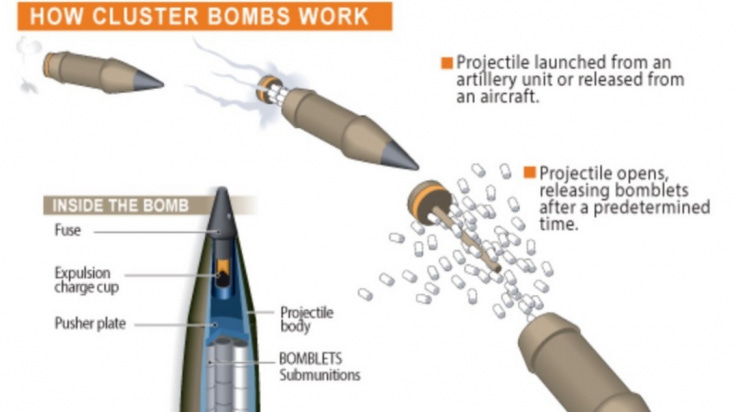What are cluster munitions and why does it matter?
TL;DR: Indiscriminate weapons; your life if you're a civilian
This week, the cluster munitions promised by the Biden Admistration to Ukraine arrived.
At a time when Ukraine is mounting a (hopefully) decisive counteroffensive against the Russian invasion, the Ukrainians say that the munitions are crucial if they want to advance against entrenched Russian troops.
There’s no question they’re right about effectiveness. Ukraine is running out of conventional artillery shells. The provision of cluster munitions would, they say, help them maintain their positions until a resupply.
But it’s still wrong for Ukraine to use these weapons—and a disaster for the Ukrainian people.
When US national security adviser Jake Sullivan announced the plan, the justification was as hollow as any child’s protestation. “The argument I’m making,” he told journalists in early July, “is that Russia has already spread tens of millions of these bomblets across Ukrainian territory.”
So the other guy did it—and that makes it ok? If the Russians execute prisoners of war and civilians—which they do routinely—does that make it right for us to do the same? When Syria’s Assad used chemical weapons on his own people, are we loading up the chlorine gas, too?
Briefly, the description “cluster munitions” covers a kind of bomb that can release hundreds of “submunitions,” sometimes called bomblets, capable of killing everything they reach (here’s a good explainer from the Washington Post). Essentially, the carrier bomb explodes before hitting the ground, spreading the bomblets over an area the size of a large city park. Depending on the type, a bomblet can pierce a tank’s armor or shred a human being.
Here’s the essential point. There is no way of precisely aiming cluster munitions. They can fall on or near a detachment of soldiers, sure. But the radius of the explosion can also include civilian dwellings or protected sites, like hospitals or mosques. Cluster munitions are indiscriminate, meaning that they can’t be controlled to just kill soldiers within that area.
As serious, according to The International Committee of the Red Cross, cluster munitions typically leave behind unexploded bomblets (as high as 40 percent of the payload in some cases). That means that once the soldiers—and the war—move on, the bomblets lie in wait for the next unlucky person to come along. The bomblets are especially dangerous to children since they are small and often colorful.
Even a small failure rate can leave dozens of potentially fatal explosives around. This Human Rights Watch report details the horrifying impact of Ukraine’s own use of cluster munitions and how they impact Ukrainian citizens.
The laws of war require that armies do everything in their power to minimize civilian casualties. That doesn’t mean they can’t act if civilians will be harmed. But that harm has to be proportionate to the purpose of the mission. Armies can’t destroy a city just to get to a military base inside it, for example.
And cluster munitions are, by their very nature, indiscriminate. Both the US and the Ukrainians are making a serious mistake by using them.
As of today, over 123 countries have joined the 2008 Convention on Cluster Munitions, which bans the use, production, and stockpiling of cluster munitions. As the then-UN Secretary-General Ban Ki-Moon noted, the convention expresses “not only the world’s collective revulsion at these abhorrent weapons but also the power of collaboration among governments, civil society and the United Nations to change attitudes and policies on a threat faced by all humankind.”
Neither Russia, the US, nor Ukraine have signed the convention. President Barack Obama tried to eliminate US cluster munitions with a failure rate above 1%, but his successor canceled the effort. The type of munitions now in Ukraine was last used by the US in 2003 in the invasion of Iraq. The failure rate is 3%.
Senator Chris Murphy (D-CT) made perhaps the most important argument against cluster munitions: a moral one. Armies always want to use whatever they can to win. But some things—including the use of cluster munitions—cede the most effective weapon anyone has: fighting for the right cause in the right way.
“We need to play the long game,” Sen. Murphy wrote. “And depressing the moral authority of both Ukraine and the United States in the fight against war crimes and dangerous weapons technologies has potentially serious consequences.”
A Kickstarter for audio
My Kickstarter for The Bond Trilogy audio is ONGOING. I have sixty days to raise $6,000 to bring The Hive Queen and The Mother’s Wheel to sound — and open the door to new listeners. Please consider supporting (for fabulous incentives…)
The Bond e-book is currently FREE on Amazon for summer reading in July. The Hive Queen and The Mother’s Wheel e-books are on sale for $2.99 each. Please pass the word!
AN AWARD!
Proud to have Righting Wrongs: 20 human rights heroes around the world on the awards and finalists list with other Chicago Review Press writers during this award season! Righting Wrongs won a Foreward Award Silver for best children’s non-fiction in 2022.
Thanks for reading!





